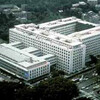
The nature and value of dialogue and the importance of mutual respect within, between and among cultures were the focus of this afternoon’s discussion among participants in the first of three scheduled plenary sessions at the United Nations International Meeting in Support of Israeli-Palestinian Peace, held at the Rome headquarters of the Food and Agriculture Organization. During the session — whose theme was “Peace in the Middle East: A key to the advancement of the dialogue between cultures and civilizations” — participants responded to the presentations of five expert panellists, who discussed three themes, including the urgency of resolving the Israeli-Palestinian conflict. Read more about UN meeting on Israeli-Palestinian peace emphasizes nature and value of dialogue

By traditionally wide margins, the General Assembly today adopted a series of resolutions on the situation in the Middle East, including one text reaffirming the United Nations’ permanent responsibility regarding the question of Palestine, until the question is resolved in all its aspects and in accordance with international law. Stressing the need for realization of the inalienable rights of the Palestinian people, primarily the right to self-determination and the right to their independent State, the Assembly adopted, by a recorded vote of 157 in favour to 7 against, with 10 abstentions, a text on the “peaceful settlement of the question of Palestine,” which stressed the need for Israel’s withdrawal from the Palestinian Territory occupied since 1967. Read more about UN reaffirms permanent responsibility for Palestine

The more than 800,000 vulnerable Palestinians of Gaza were trapped in a nightmare, owing to a combination of financial sanctions against Hamas, a ten-week siege of Gaza, daily targeted killings of suspected militants and Israeli incursions into densely populated neighbourhoods, the Commissioner-General of the United Nations Relief and Works Agency for Palestine Refugees in the Near East (UNRWA), Karen AbuZayd, said today at a headquarters press conference. Strangulation of commerce and trade had ruined the economy, brought the institutions of Government to a near meltdown, and badly shaken the society, she said. Read more about U.N. refugee official says Gaza's residents deserve protection

The Bureau of the Committee on the Exercise of the Inalienable Rights of the Palestinian People expresses its grave concern over the ongoing Israeli military operations in the Occupied Palestinian Territory, including East Jerusalem, which has resulted in many Palestinian civilian casualties and a major humanitarian crisis. Since Israel, the occupying Power, started its major military operation in the Gaza Strip on 28 June 2006, following the capture of an Israeli soldier by Palestinian groups, more than 130 Palestinians have been killed, many of whom were innocent civilians, including more than 30 children. Hundreds of Palestinians were wounded. Read more about UN Palestine Committee expresses grave concern over ongoing Israeli military operations
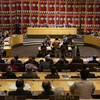
The Economic and Social Council this afternoon adopted a resolution on the economic and social repercussions of the Israeli occupation on the living conditions of the Palestinian people in the occupied Palestinian territory, including East Jerusalem, and the Arab population in the occupied Syrian Golan. The resolution, adopted by a roll-call vote of 45 in favour to 3 against, with 3 abstentions, called for the lifting of the severe restrictions imposed on the Palestinian people; and demanded that Israel comply with the Protocol on Economic Relations between the Government of Israel and the Palestine Liberation Organization signed in Paris on 29 April 1994 and that it urgently transfer Palestinian tax revenues. Read more about Economic and Social Council adopts resolutions on repercussions of Israeli occupation on Palestinians
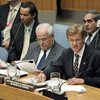
At a Headquarters press conference this afternoon, United Nations top humanitarian official outlined his efforts to organize humanitarian assistance for the affected population in Lebanon, including requests for humanitarian access and a planned flash appeal for funding. Under-Secretary-General for Humanitarian Affairs, Jan Egeland, who is also United Nations Emergency Relief Coordinator, told correspondents that with the humanitarian situation in Lebanon deteriorating “by the day and by the hour”, over half a million people, including internally displaced persons and refugees, urgently needed assistance now. Read more about UN Emergency Relief Coordinator calls for humanitarian corridors to address worsening crisis
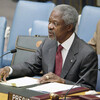
Secretary-General Kofi Annan called Thursday for an immediate halt to the escalating conflict between Israel and Lebanon’s Hezbollah militia but said there were “serious obstacles to reaching a cease-fire.” Annan addressed members of the Security Council during a meeting on the situation in the Mideast at United Nations headquarters in New York. He condemned Israel’s “excessive use of force” and collective punishment of the Lebanese people, saying it had triggered a humanitarian crisis. He urged the members of the Security Council to take firm action towards ensuring peace and stability in the Middle East region as mandated by the Charter of the United Nations. Read more about Annan calls for immediate end to conflict
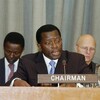
At the opening session of the United Nations Seminar on Assistance to the Palestinian People, Secretary-General Kofi Annan said he respected the decision of the Palestinian people in their election of a Palestinian Legislative Council and hoped the new Cabinet of the Palestinian Authority could address their aspiration for peace and statehood, as articulated by President Mahmoud Abbas. In a statement read out by Assistant-Secretary-General for Political Affairs Angela Kane, he called on both parties to work towards the implementation of the Access and Movement Agreement, and urged the international community to find ways of continuing and intensifying support for the Palestinian people. All must understand that the Palestinian Authority must provide the bulk of the basic services necessary to avert a humanitarian crisis. Read more about Seminar on Assistance to Palestinian People opens in Cairo, Secretary-General calls on international community to intensify support for Palestinians
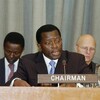
In his keynote address to the United Nations Seminar of Assistance to the Palestinian People this afternoon, Member of Palestinian Legislative Council Nabil Sha’ath said the new cabinet was willing to accept financial oversights or to have money transferred through President Abbas, but it could not accept the attempt to bypass the Palestinian Authority. This afternoon’s session, part of a two-day meeting sponsored by the Committee on the Exercise of the Inalienable Rights of the Palestinian People, heard presentations by experts on the scope of the economic and humanitarian crisis in the Occupied Palestinian Territory. Read more about Cairo meeting addresses economic, humanitarian crisis in Palestinian Territory
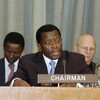
United Nations Conference on Trade and Development (UNCTAD) Economic Affairs Officer Mahmoud ElKhafif said conflict, political instability, an elusive sovereignty and a policy of asymmetric containment had hampered the Palestinian Authority’s ability to ensure any governance, much less a corruption-free, best practice model. Speaking at the last panel discussion of the United Nations Cairo Seminar on Assistance to the Palestinian People, he said humanitarian relief and budget support were inadequate to reduce poverty and economic vulnerability under current conditions. Sustained economic recovery required either dismantling the politics of asymmetric containment or dealing with it as an external constraint in the short term while working towards its eventual elimination. Read more about United Nations Seminar on Assistance to Palestinian People concludes









